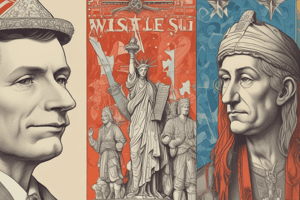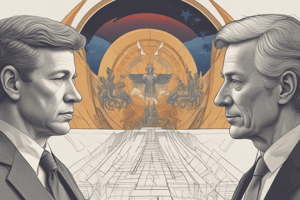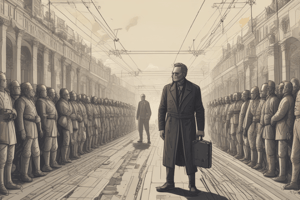Podcast
Questions and Answers
Comparative studies of government during the early 20th century included a focus primarily on Asian political institutions.
Comparative studies of government during the early 20th century included a focus primarily on Asian political institutions.
False (B)
The aim of comparative politics is to identify similarities and differences between the governmental systems of different countries.
The aim of comparative politics is to identify similarities and differences between the governmental systems of different countries.
True (A)
The studies conducted by scholars like James Bryce and Carl Friedrich mainly concentrated on informal political structures.
The studies conducted by scholars like James Bryce and Carl Friedrich mainly concentrated on informal political structures.
False (B)
The field of comparative politics considers both governmental and extra-governmental structures involved in the power struggle.
The field of comparative politics considers both governmental and extra-governmental structures involved in the power struggle.
Theories and practices studied in comparative politics are exclusively tied to the historical events of the 19th century.
Theories and practices studied in comparative politics are exclusively tied to the historical events of the 19th century.
Codified constitutions are often created as a result of significant political upheaval or the end of a war.
Codified constitutions are often created as a result of significant political upheaval or the end of a war.
The United Kingdom has codified its constitution in response to historical political events.
The United Kingdom has codified its constitution in response to historical political events.
Aristotle's concept of a constitution included various meanings depending on the context in which it was used.
Aristotle's concept of a constitution included various meanings depending on the context in which it was used.
Every state inherently has a constitution, regardless of how well or poorly it is governed.
Every state inherently has a constitution, regardless of how well or poorly it is governed.
The concept of electoral systems relates solely to the selection of representatives without considering the electorate's preferences.
The concept of electoral systems relates solely to the selection of representatives without considering the electorate's preferences.
Electoral systems primarily determine the way votes are cast and not how they are translated into seats.
Electoral systems primarily determine the way votes are cast and not how they are translated into seats.
In a representative democracy, the executive branch is responsible for making laws rather than enforcing them.
In a representative democracy, the executive branch is responsible for making laws rather than enforcing them.
Majoritarian and proportional are two main types of electoral formulae used in elections.
Majoritarian and proportional are two main types of electoral formulae used in elections.
Clientele agencies are designed to address the needs of specific districts rather than broader national interests.
Clientele agencies are designed to address the needs of specific districts rather than broader national interests.
The separation of powers in a government means that the executive branch operates independently of the legislative branch.
The separation of powers in a government means that the executive branch operates independently of the legislative branch.
Flashcards are hidden until you start studying
Study Notes
Birth and Development of Comparative Government and Politics
- Key scholars in the early development include James Bryce, Herman Finer, Carl J. Friedrich, Roberto Michels, and M. Duverger.
- Focus was on comparative studies of political institutions, power distribution, and intergovernmental relationships.
- Initial studies were predominantly eurocentric, concentrating on Britain, France, and Germany.
Goals and Importance of Comparative Government and Politics
- Aims to identify political similarities and differences across nations.
- Seeks to illustrate the mixture of enduring features and variations in global political systems, considering various contexts.
Scope and Concepts of Comparative Government and Politics
- All Political Structures: Encompasses formal and informal structures involved in power struggles beyond just legislative, executive, and judicial organs. Includes bureaucracy, interest and pressure groups, elites, and political parties.
- Functional Studies: Emphasizes the political process's functions such as interest articulation, aggregation, communication, rule-making, adjudication, socialization, decision-making, and policy-making.
- Political Behavior: Investigates how individuals behave in political contexts, covering aspects like voting behavior, participation, leadership recruitment, and the dynamics of populism.
- Similarities and Differences: Analyzes the least descriptive and legalistic variations in political processes, focusing on empirical functions and non-normative comparisons, aiming for thorough understanding rather than judgment of superiority.
- Study of All Political Systems: Reviews both Western and non-Western political systems, assessing structures, functions, and performances to contribute to theory-building.
Comparative Politics vs. Comparative Government
- Comparative politics examines formal and informal institutions; comparative government focuses only on formal institutions.
- Comparative politics studies political systems globally, while comparative government is limited to Western democracies.
- Comparative politics involves analytical research methods, whereas comparative government tends toward descriptive analysis of institutions.
- Comparative politics incorporates economic, cultural, and social factors into its analysis, unlike comparative government.
Meaning of State, Nation, Sovereignty
- State: Defined as a territory hosting institutions and populations.
- Nation: A large group of people sharing history, culture, or other common traits, inhabiting a specific territory.
- Sovereignty: Represents supreme authority or the highest power in political affairs.
Elements of the State
- People: The population necessary for governance and social structure.
- Territory: The physical space under a state's jurisdiction, including land, water bodies, and airspace.
- Government: The mechanism through which state objectives and will are executed.
- Sovereignty: The ultimate authority within a state to command compliance and maintain autonomy from external forces.
Kinds of Sovereignty
- Titular Sovereignty: Symbolic ruling authority without actual power, as seen in monarchs or ceremonial leaders while real power resides with the people.
- Internal Sovereignty: The state's power to govern all individuals and groups within its borders, defining the rule of law and internal governance.
CONSTITUTIONS
- Constitutions outline fundamental principles governing a state, detailing the structure of government institutions and their interrelations.
- They define citizens' rights and duties while limiting the exercise of state power.
- Codified constitutions often emerge from significant political changes, such as revolutions or wars, exemplified by the U.S. Constitution (1787) and the French Constitution (1791).
- The UK does not have a codified constitution due to its unique historical context.
- The concept of a constitution originated with ancient Greek philosophers, especially Aristotle, who used the term "politeia" to mean the organization of governmental offices.
ELECTORAL SYSTEMS
- An electoral system is a set of rules that govern the process by which voters select representatives.
- Key components include:
- Ballot structure: the method and intent behind casting votes.
- Constituency structure: how the electorate is divided into defined areas.
- Electoral formula: the method of translating votes into seats.
- Major types of electoral formulae include majoritarian, plurality, and proportional systems, which shape political representation and voter behavior.
- The electoral system fundamentally influences political participation and government formation.
EXECUTIVES
- The executive branch is tasked with governance and law enforcement within a political system characterized by separation of powers.
- It includes diverse entities such as cabinet departments, independent agencies, and regulatory commissions.
- Bureaucracies are organized hierarchically, enhancing efficiency through specialization and streamlined procedures.
- "Clientele agencies" serve specific societal interests, exemplified by departments like Agriculture and Labor.
- Bureaucrats play critical roles in law enforcement, administration, and conflict resolution, often carrying out duties delegated by legislative bodies.
LEGISLATIVE BRANCH
- Responsible for law-making, the legislative branch comprises Congress, including the House of Representatives and the Senate, elected by voters.
- The primary function is to create laws, initiated through bills proposed by Congress members.
- Key powers include:
- Borrowing money
- Regulating commerce
- Coining money
- Declaring war
- Establishing post offices
- The House can impeach the President, while the Senate has exclusive powers like ratifying treaties and confirming presidential appointments.
FEDERALISM
- Federalism divides governance between a central authority and smaller political subdivisions, such as states and cities, allowing shared law-making responsibilities.
- The Constitution explicitly delineates powers for both national and state governments, promoting autonomy and local governance.
- Challenges of federalism include minority protection, coordination difficulties during crises, and resource demands for establishing institutions at all levels.
DECENTRALIZATION
- Decentralization refers to transferring authority and responsibility from central to subordinate governments or the private sector.
- Political decentralization enhances citizen involvement in decision-making, promoting pluralism and representative governance.
- Administrative decentralization redistributes responsibilities and resources for public service management across various government levels.
- Successful decentralization requires local governments and organizations to have adequate revenue and decision-making authority over expenditures.
Studying That Suits You
Use AI to generate personalized quizzes and flashcards to suit your learning preferences.




